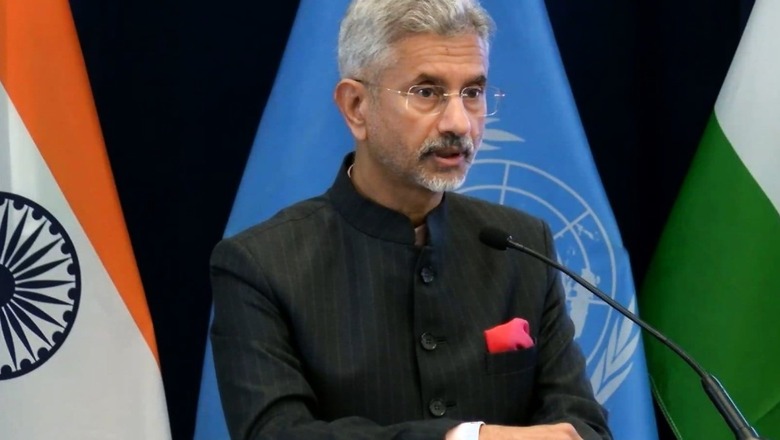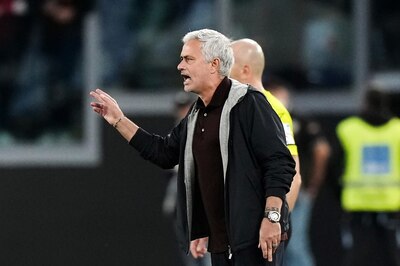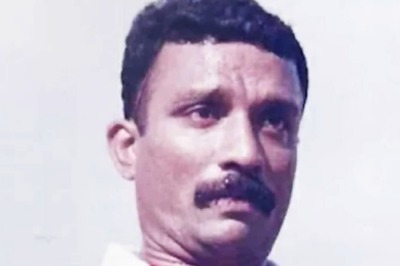
views
Addressing the UN Security Council on 22 September, External Affairs Minister S Jaishankar said, “The trajectory of the Ukraine conflict is a matter of profound concern for the entire international community. The future outlook appears even more disturbing. The nuclear issue is a particular anxiety.” This summed up well the sentiments of India and the non-Western countries in general.
The situation in Ukraine is without doubt getting increasingly disquieting. The collective West is ranged against Russia. Europe, which is the seat of this conflict, will feel its consequences the most. Yet, European leaders, especially at Brussels, appear confrontational with no discernible strategy of creating conditions for dialogue and diplomacy other than continuing to support Ukraine militarily and economically to build resistance against Russia and give it a stronger hand in any future negotiations.
Poland and the Baltic states, backed by the US and the UK, seem to be driving Europe’s uncompromising position. European circles believe that if Russia succeeded in Ukraine, it will subsequently target other neighbouring states, without explaining why Russia did not, unlike Ukraine, make NATO membership of Poland and the Baltics a red line and why their membership of this security alliance is not a deterrence.
The Ukraine conflict has now become a proxy war between the US-led West and Russia. Worryingly for the rest of the world, the world’s two foremost nuclear powers are getting locked into a conflict from which a retreat by either side, short of military defeat on the ground, seems virtually impossible. The channels of dialogue between the two sides are not functioning. Both sides are now thinking the worst of each other.
The stakes of both sides in the conflict and its outcome do not, however, seem to be equal. Russia sees the conflict as existential, convinced that the West now seeks a break-up of Russia following the Soviet Union’s demise, with Ukraine as a bridgehead to achieve that goal. The unprecedented nature of sanctions imposed on Russia to cause its economic collapse would suggest this. A regime change in Moscow and the trial of President Vladimir Putin as a war criminal are declared US goals. For the US, the conflict is not existential. The power and the global pre-eminence of the US may be eroded by a Russian success in Ukraine, but America’s physical security is not endangered. In Europe’s case, however, a stronger Russia would remain a geopolitical challenge, complicating the EU’s eastward expansion, straining European unity, necessitating compromises.
Putin has announced a partial mobilisation —an additional 300,000 troops — for the combat in Ukraine and referenda in four eastern Ukraine regions for their eventual union with Russia. The timing of his announcement, at the start of the UNGA session, knowing that the West would exploit this to mobilise opinion against Russia both in the Security Council and the General Assembly signals a worsening of the atmosphere of Russia-West confrontation over Ukraine, with the international community increasingly a helpless spectator of developments. Significantly, Putin’s speech was released on the same day that President Biden and President Zelenskyy were to address the UNGA.
Putin in his address made it clear that in the event of a threat to the territorial integrity of Russia and to defend his people he “will certainly make use of all weapons available”, and that this “is not a bluff”. He referred to nuclear blackmail by the West, including encouraging the shelling of the Zaporizhzhia nuclear power plant. Russia’s concerns about the development of US anti-ballistic missile capability that could give it first strike capability, with its seeds in the US repudiation of the ABM Treaty, aggravated by the placement of ABM components in Poland and Romania and rejection of the INF Treaty are not new. This prompted Putin himself as far back as in March 2018 to unveil new Russian weapons that would be impervious to interception by any US system. In his recent address he recalled that Russia has some weapons that are more modern than those possessed by NATO countries. The short point is that the nuclear issue between the US and Russia has been on the table for a long time, marked by some major nuclear disarmament treaties as well as nuclear competition and threats.
Whether Putin is right or wrong to harbour nuclear fears or make nuclear threats is less relevant than the reality of the nuclear question. The West has for years projected South Asia as a nuclear flashpoint because of India-Pakistan differences degenerating into a nuclear conflict. That concern seems to be disregarded by the West in its developing confrontation with Russia, demonstrating again how there are different measures to assess responsible nuclear politics as between developed and developing countries. Jaishankar was right in expressing India’s anxiety over the nuclear issue in particular.
Consistent with the position we have taken all along on the Ukraine crisis, Jaishankar drew attention to the impact of the conflict in distant regions in terms of surging costs and actual shortages of foodgrains, fertilizers and fuel, with worry that the situation may worsen. He spoke against initiating “measures that further complicate the struggling global economy”, which can be read as a reference to more sanctions, and said that “India strongly reiterates the need for an immediate cessation of all hostilities and a return to dialogue and diplomacy”, a comment directed at both Russia and the West. He repeated PM Narendra Modi’s observation during his meeting with President Putin that this “cannot be an era of war”, knowing that this has been widely construed by Western governments and media as a “rebuke” to Russia and this reiteration ran the risk of confirming that Modi did intend it as a reproach, though it is clear from any objective interpretation that what was said is equally applicable to the West’s strategy of arming Ukraine, giving it the sinews to inflict reverses on Russia and seeking its military defeat.
Jaishankar’s statement that “even in conflict situations, there can be no justification for violation of human rights or of international law” is one of principle and does not hold either side responsible about allegations of killings in Izyum. India again asked for, as in the case of Bucha killings, that these allegations must be “investigated in an objective and independent manner”. This is the right position to take, without taking sides in the propaganda battles over the Ukraine conflict.
Emphasising that “the need of the hour is to end this conflict in Ukraine and return to the negotiating table”, Jaishankar affirmed: “The global order that we all subscribe to, is based on international law, UN Charter and respect for the territorial integrity and sovereignty of all States. These principles too must be upheld, without exception.” The clause “without exception” no doubt refers also to instances where the West has violated these principles and also China blatantly in the western Pacific and in the Himalayas.
On 24 September, addressing the UN General Assembly, Jaishankar reiterated India’s concerns about the consequences of the Ukraine in terms of the rising costs and the shrinking availability of fuel, of food and of fertilizers, besides trade disruptions and diversions. He addressed frontally the criticism in the West about whose side India is on with regard to the continuing Ukraine conflict. India, he asserted, is firmly on the side of peace, on the side that respects the UN Charter and its founding principles and calls for dialogue and diplomacy as the only way out, as also on the side of those struggling to make ends meet, even as they stare at the escalating costs of food, of fuel and fertilizers. He emphasised that it was in the collective interest of the international community “to work constructively, both within the United Nations and outside, in finding an early resolution to this conflict” — a responsible position to take.
In sum, India’s carefully crafted position on Ukraine is unchanged. It has stuck to its position of neutrality on the Ukraine issue even as it is becoming more dangerous because of escalatory steps by both sides. It is neither endorsing Russia’s case — though not condemning Russia is seen by the West as being pro-Russia — nor that of the West, when it can come out openly but has not against funnelling billions worth of arms to Ukraine so that the conflict is prolonged. India is expressing its opposition to war as a solution. It is throwing the responsibility on both sides to return to the path of diplomacy and dialogue. It is also taking the leadership to highlight the consequences of the conflict for the Global South.
Kanwal Sibal is former Indian Foreign Secretary. He was India’s Ambassador to Turkey, Egypt, France and Russia. The views expressed in this article are those of the author and do not represent the stand of this publication.
Read all the Latest Opinion News and Breaking News here




















Comments
0 comment